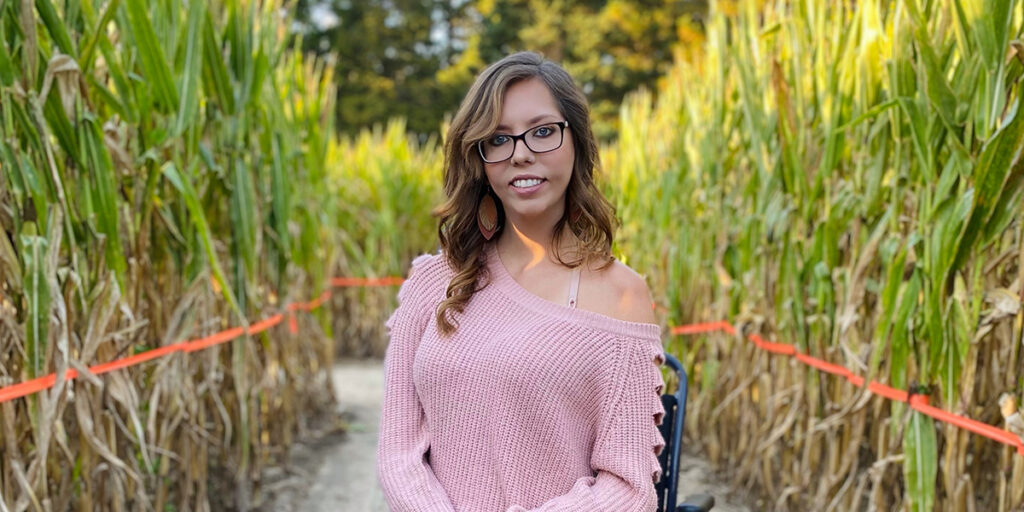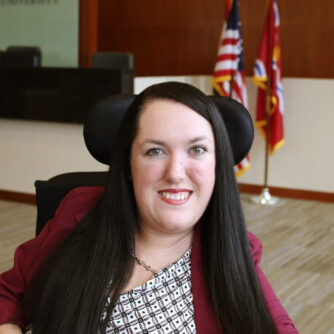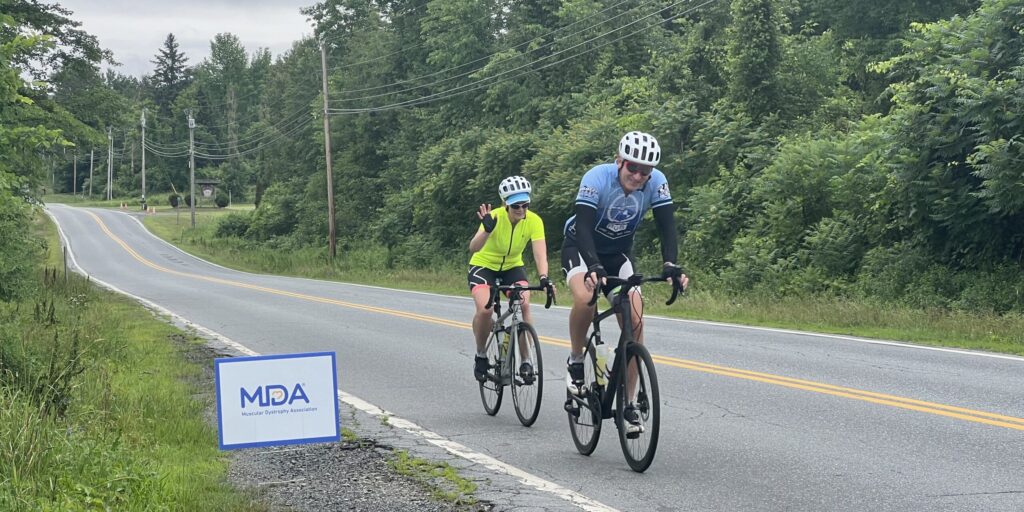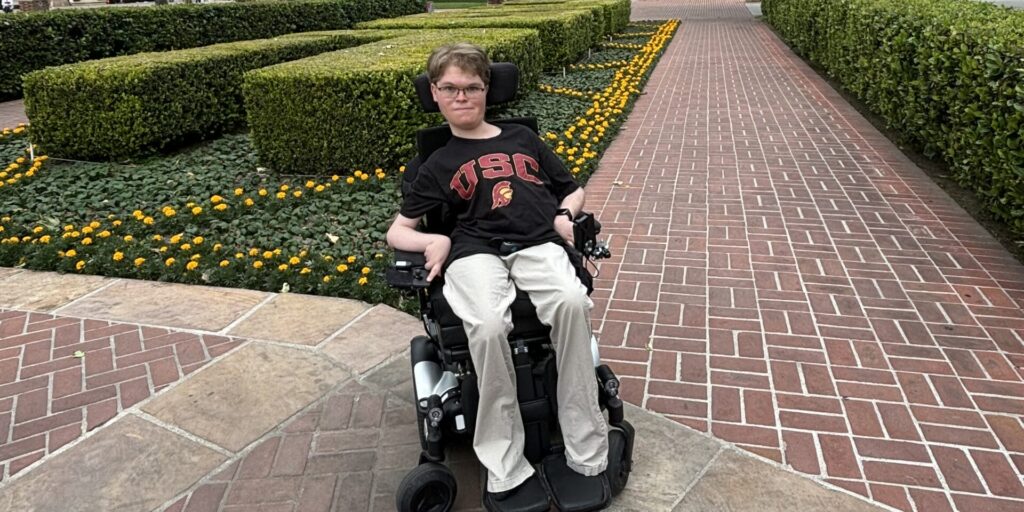
Muscular Dystrophy and Dating
By Elizabeth Millard | Thursday, February 16, 2023
5 Second Summary
Why does dating feel like such a struggle? How can I overcome misconceptions about me? Neuromuscular disease community members and a mental health expert answer these questions and more.
When Gabriella Garbero was a teenager, she felt as if she was watching from the outside as friends began to pair up, break up, and experience all the thrills and heartbreaks that come with young love.

Gabriella Garbero has found that open communication helps develop intimacy with a partner.
“What affected me in my romantic life was the same misconception that I had socially, that people thought I ‘wasn’t into that stuff,’ so I never got asked to parties or on dates,” says Gabriella, a 32-year-old with spinal muscular atrophy (SMA) in St. Louis, who writes the blog The Girl Who Sits. “When you’re young, you don’t have the vocabulary to say: Yes, I’d like to go on dates, and yes, I can have sex. Even when you become more mature, it can feel like a lot to unpack before you’re comfortable with dating and intimacy.”
To overcome misconceptions like these, it’s important to have several types of strategies, according to Paige Lembeck, PhD, a psychologist at the Children’s Hospital of Philadelphia, assistant professor of psychiatry at the University of Pennsylvania, and formerly a pediatric psychologist at an MDA Care Center.
Here are some tips for dating and intimacy with a neuromuscular disease, whether you’re just wading into the dating pool or navigating a relationship.
Know you’re not alone
Dating is tough for everyone, not just those with disabilities. “Honestly, it’s tough out there, and even with dating apps, it’s difficult to find your person,” Dr. Lembeck says. “Normalizing and acknowledging that reality is crucial, because it may help you adjust.”
For example, she notes that when people with disabilities feel that “everyone else” is successful in finding dates and relationships, it can be de-motivating and prompt depression symptoms. But embracing the fact that dating is sometimes a long process can build resilience — and most of all, allow you to have fun rather than seeing it as a chore.
Check your inner biases
When dating feels like a struggle, Dr. Lembeck says it can be easy to experience “cognitive distortions,” which are essentially thinking mistakes that we all make as we move through life. This means you tend to lean toward more negative thinking that can discount positive experiences, magnify what you might perceive as faults, and jump to conclusions.
“When these distortions are present, you might start to believe you don’t deserve love and affection,” she says. “The opposite is true. Everyone deserves to have a partner who cares for them and helps make a hard road a little easier.”
For example, if you’re turned down for a date with someone who interests you, take a moment to ask: How much is this really about you as a person? Most likely, it’s more about being incompatible. Adding that type of objectivity can stop negative thoughts from kidnapping your emotions, Dr. Lembeck suggests.
“I’ve struggled a lot of my life with loneliness and feeling like I wasn’t pretty enough,” Gabriella says. “I really wish I could meet myself as a teenager and tell her to stop overthinking it. Society sends so many bad messages that are easy to absorb and turn into beliefs. It’s helpful to realize that and think about how you’re talking to yourself.”
Start with your values
Although many people tend to think about what they want in a partner as a first step in dating, a better strategy is to look inward. What are your passions? What traits do you most value in yourself? By thinking more deeply about what you find meaningful, you’re more likely to discover people who share those qualities.
“Also, consider what may need to be worked on, if you feel like it’s getting in your way,” Dr. Lembeck says. “For instance, if you’re socially anxious, you can work with a therapist on treatment options, so it’s not another barrier for you.”
Be upfront about your disability
When Skye Anderson, 31, who has facioscapulohumeral muscular dystrophy (FSHD), began online dating, she was still able to walk, but she made sure to explain to potential dates that she walked differently.
“I felt this insecurity from them — that they would feel pressure to still go through with the date even if they weren’t comfortable with it,” she says. “Now that I use a wheelchair, they can see from my photos that I have a disability and can determine whether or not they’re comfortable without me having to explain everything.”
She also addresses her mobility in her profile and even posted a funny list of “pros and cons of being in a wheelchair” to show that this is an important part of her life, and if someone has an issue with that, then they’re not compatible.
“Dating while using a wheelchair changes locations, but it doesn’t change the situation,” she says. “It’s still about trying to find someone both compatible and accepting. It takes being vulnerable, open, and above all, knowing yourself and your self-worth so when someone says something negative, you can be so secure in yourself that it doesn’t alter your mindset.”
One common question Skye gets asked is, “Can you have sex?” While this is generally rude coming from a stranger, Skye says she doesn’t mind answering for a potential partner because being sexually active is important to her as well, and talking about it upfront can be a way to build communication and trust.
“My advice is to just put yourself out there,” she adds. “Go for the experience, if nothing else, because the more you interact socially, the better you get to know yourself.”
Expand your communication
If you’re in a relationship and feel that sex looms large as a potential issue — as it does for a lot of people, disability or not — talking about it is the best solution. According to Dr. Lembeck, everything should be on the table to discuss or work through together: any concerns about pain, mobility limitations with certain positions, the need for accommodations like extra pillows, and difficulty with emotions during intimacy. The more often you communicate on a breadth of topics like these, the easier it tends to become.
One way to get to that point is to talk openly about everything else, so you’re comfortable with each other before getting physical, suggests Gabriella. By the time she became sexually active with the person who is now her fiancé, they already felt intimate.
“Communication truly is key,” she says. “You have to feel like this is a journey you’re on together, that you’re figuring things out as a couple.”
Next Steps and Useful Resources
- Watch the MDA On-Demand Webinar Creating Strong Relationships and Connections.
- Listen to conversations with interabled couples in the Quest Podcast episode Love & Marriage.
- Read about forming and nurturing healthy romantic relationships in the Quest article Positive Relationships.
- Lean how people in the neuromuscular disease community are building body positivity in Embrace Your Body.
TAGS: Featured Content, Relationships, Young Adults
TYPE: Featured Article
Disclaimer: No content on this site should ever be used as a substitute for direct medical advice from your doctor or other qualified clinician.




